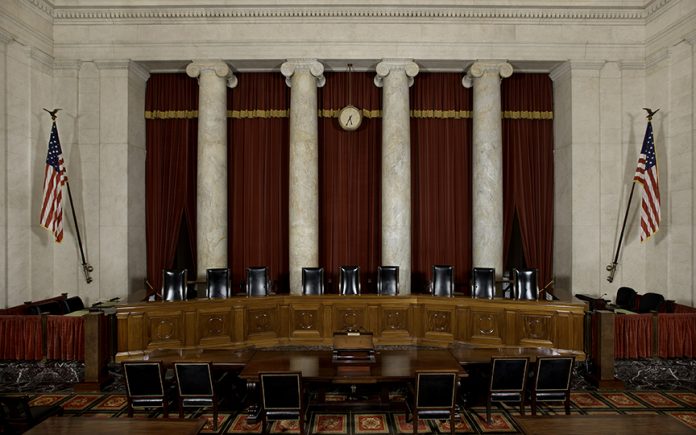Our country is at a crucial crossing point. In the past, even though there were extraordinarily damaging disputes such as the Civil War, the country survived them by adhering to its founding fathers’ principle that ours was “a country of laws, not men.” In other words, the Constitution was worth protecting at all costs, lest we descend into some form of tyranny — which, by definition, is government by man (or men), not by law. The tyrant, not the Constitution, defines in that case what the law is.
As evidenced by the recent presidential election, it is now an open question whether ours may still be said to be a country of laws. This question is brought into sharpest focus by the recent lawsuit filed by the State of Texas in the United States Supreme Court, which invokes that Court’s “original and exclusive” jurisdiction over cases and controversies between the several States, conferred by Article III of the Constitution and by Congress (in Title 28, United States Code, Section 1251).
While the Supreme Court’s jurisdiction is normally “appellate” — meaning that it has power to review decisions on appeal from lower courts — “original” jurisdiction refers to the (rather rare) type of cases which must be commenced at the outset in the U.S. Supreme Court. And the additional word “exclusive” means that no State has the ability to file any such lawsuit against another State in any state or lower court, but must bring it, if at all, before the United States Supreme Court.
Actually, due to the archaic practice of the Supreme Court, a State invoking its original jurisdiction cannot simply file a complaint in that court, but according to tradition, files a “motion for leave” (i.e., permission from the Court) to file such a complaint. According to past decisions, the Court’s inherent power over its own docket confers it with the discretion to deny such leave at the outset, and so refuse to exercise such jurisdiction. However, recently justices (e.g., Justice Thomas, joined by Justice Alito) have suggested that the Court lacks that discretion when States invoking the Court’s original jurisdiction have no other judicial forum available to adjudicate their claims. (See the discussion in Texas’ Brief in Support of Motion for Leave to File, in the .pdf of the lawsuit, following the complaint itself, at page 34.)
The lawsuit asks the Supreme Court to take cognizance of the lawlessness in the voting for president that allegedly occurred in the various “swing” states (meaning those states whose electoral votes could, in the totals recorded in the Electoral College votes next December 14, cause the presidential election to go to one candidate or the other — because the results otherwise would be inconclusive). There is a very good summary of the complaint’s allegations of what went wrong in each swing state’s voting procedures in this post, so I will not repeat them here.
Reduced to its essentials, the proposed complaint says that each swing state (Georgia, Michigan, Pennsylvania and Wisconsin) allowed persons other than that state’s legislature to alter, before the 2020 election, the previously legislated procedures for choosing the presidential electors from that state. Since the United States Constitution provides, in Article II, Section 1, Clause 3 (italics added) that “each State shall appoint, in such Manner as the Legislature thereof may direct,” the Electors from that State who are to cast their votes in the Electoral College on the appointed date (which this year falls on December 14), Texas charges each swing State with violating that clause by the actions their officials took without legislative authority, all as detailed in the link in the previous paragraph.
Now consider the gist of Texas’ proposed complaint. The United States is a confederation of States joined in a perpetual Union for their mutual benefit. While each State is sovereign in itself, it submits that sovereignty, through the Constitution to which it accedes, to the overall authority of the United States of America — which includes its three branches of government. It is the Constitution which defines and delimits the extent of the authority of each of those branches in respect of the country as a whole. And the Tenth Amendment to the Constitution ensures that “[t]he powers not delegated to the United States by the Constitution, nor prohibited by it to the States, are reserved to the States respectively, or to the people.”
Among the powers delegated to the United States are those establishing the Executive Branch (Article II of the Constitution, vesting those powers in a President). But that same Article, as noted earlier, reserves to the States the power to “appoint, in such Manner as the Legislature thereof may direct, a Number of Electors, equal to the whole Number of Senators and Representatives to which the State may be entitled in the Congress.”
Notice that the language of Article II does not delegate the authority to specify how Electors may be chosen to any body other than the “Legislature” of a given State.
Thus, neither a State’s governor, nor Secretary of State, nor a county elections board, nor a county clerk or elections supervisor, nor even a State’s Supreme Court or lower court, has been granted any power to specify how that State’s presidential Electors are to be chosen. Such an election of Electors for that State may be conducted only in conformity with the laws duly enacted by that State’s legislature.
Normally, a State’s legislature passes laws pursuant to authority granted by that State’s constitution, in parallel with the way that the United States Constitution authorizes Congress to enact federal laws. But just as Congress’ powers to enact laws may be constrained by the Constitution (e.g., “Congress shall make no law respecting an establishment of religion . . . “), so also may the citizens of a given State establish a constitution which limits that State’s legislature in the kinds of law that it may enact.
In the case of Pennsylvania, for example, that State’s constitution spells out in its Article VII the basic law for elections. Although Section 14 of that Article provides for absentee balloting, that provision in no way authorizes the kind of lax mail-in balloting that Pennsylvania’s legislature purported to authorize by its enactment of laws in 2019 and 2020.
So the Texas lawsuit presents the following substantial question: When a State allows its presidential electors to be chosen in a manner beyond that authorized by its own constitution or legislature (acting in accordance with its constitution), does that unlawfulness prejudice the ability of other States to participate in the Electoral College?
It seems unarguable that such unlawfulness negates the ability of other States to elect a president under our Constitution. If the result of voting in the Electoral College is tainted by votes from States that ignored their own laws, how can one argue that the States acting illegally had no effect on the result, and operated to frustrate the efforts of those States that followed their own laws? One might as well contend that there was no disenfranchisement of women in a local election if a municipality engineered matters such that only men’s votes for their candidate dog-catcher were counted.
And if we were (by constitutional amendment) to create the position of National Dog-Catcher, electable by the citizens of all 50 States, would it make any difference to the argument if one or more States were to provide by law that only males could vote for such a position? How could their votes be counted in the national tally, without a gross inequality resulting? That is the question presented by Texas’ complaint.
In other words, the lawsuit presents certain facts about the procedures followed for the presidential election in the four swing states that allegedly violated their own constitutional and legislative enactments (such as extending the deadline for submission of ballots beyond Election Day as specified by Congress, or waiving the verification of absentee ballots, or by sending out to all voters mail-in ballots even if those voters did not request any absentee ballot). It then requests the Supreme Court to rule that the failure of those States to follow their own constitutional and statutory procedures means that the balloting in those States was invalid to select Electors “in such Manner as the Legislature thereof may direct”, because they were elected pursuant to procedures not expressly authorized by the Legislature or Constitution of that State. And in turn, that invalidity taints the vote in the Electoral College, by mingling invalid votes with valid ones.
As Justice Marshall famously stated in Marbury v. Madison, “it is emphatically the province and duty of the judicial department to say what the law is.” And that is all that the Texas complaint seeks by way of relief — it expressly does not seek to have the Court adjudicate which candidate won the election.
Many of the opposition briefs filed in the Supreme Court exaggerate and distort the limited relief which Texas and its co-plaintiffs seek from the complaint. Georgia, for example, claims in its filing that “Texas seeks to alter how Georgia appoints it electors” (Brief in Opposition, at page 12). Exactly the opposite is true: Texas seeks to have Georgia adhere to its previous legislatively established method of appointing Electors. It does not want Georgia to change the rules in the middle of the game. What can be wrong with that request?
Yet to read the briefs filed in opposition to Texas’ motion to file its complaint is to indulge in all manner of egregious hyperbole and rodomontade concerning the supposedly “true” object of its filing. For just one extreme example, the Attorney General for Pennsylvania claims in his brief that Texas’ attempt to invoke the original jurisdiction of the Court is a “seditious abuse of the judicial process” (my emphasis added). Sedition, however, is an attempt to betray, or go around, specific provisions that govern the conduct of a nation — which can scarcely encompass the application of a State to that country’s Supreme Court for relief pursuant to its Constitution.
It is instructive, therefore, to focus on just what kind of relief the Texas lawsuit seeks. Here are the first two paragraphs from the prayer for relief, taken from the proposed complaint:
WHEREFORE, Plaintiff States respectfully request that this Court issue the following relief:
A. Declare that Defendant States Pennsylvania, Georgia, Michigan, and Wisconsin administered the 2020 presidential election in violation of the Electors Clause and the Fourteenth Amendment of the U.S. Constitution.
B. Declare that any electoral college votes cast by such presidential electors appointed in Defendant States Pennsylvania, Georgia, Michigan, and Wisconsin are in violation of the Electors Clause and the Fourteenth Amendment of the U.S. Constitution and cannot be counted.
If one were to take the opposition filed by Georgia as definitive (p. 30), one would conclude that these two prayers invoke a non-existent remedy, because no court (including the Supreme Court) can render any advisory opinion in a matter not involving a genuine “case or controversy” between the parties before it. But again, Georgia’s contention to that effect is hyperbole: a declaration that Georgia failed to follow its own statutory procedures in the presidential election of 2020 would by no means be abstract or advisory, but would be akin to what the Court did in Bush v. Gore (2000) 531 U.S. 98 (per curiam) — where its declaration of Florida’s failure to apply consistent standards in the counting of ballots followed from its application of federal constitutional law to Florida’s election procedures.
Thus if it accepts Texas’ complaint, the Supreme Court would be well within its adjudicatory powers to grant the relief requested in the two paragraphs quoted above. What about the next requests?
C. Enjoin Defendant States’ use of the 2020 election results for the Office of President to appoint presidential electors to the Electoral College.
D. Enjoin Defendant States’ use of the 2020 election results for the Office of President to appoint presidential electors to the Electoral College and authorize, pursuant to the Court’s remedial authority, the Defendant States to conduct a special election to appoint presidential electors.
. . .
F. Enjoin the Defendant States from certifying presidential electors or otherwise meeting for purposes of the electoral college pursuant to 3 U.S.C. § 5, 3 U.S.C. § 7, or applicable law pending further order of this Court.
These paragraphs invoke the Court’s power to provide injunctive relief, i.e., an order from the Court that a party refrain from certain conduct. Again, such relief is well within the Court’s ability to grant in the context of a given lawsuit. It is meant as a remedy to preserve the status quo from being illegally altered. Under that test, the Court again could use its powers to prevent any of the swing states from certifying election results that were the product of unconstitutional election procedures. Otherwise, its judgment that they failed to follow their own required procedures would be nugatory and of no practical effect.
(The final paragraph F of the prayer might need emendation — it is true that is is the State, through its governor, that “certifies” the electors appointed by that State, but it is the Electors themselves, not the State, that meet “for purposes of the electoral college . . .”. The suit does not propose to make the individual Electors defendants, so the Court could not issue any injunction against them to prevent them from meeting. The first part of the injunction, preventing the State from “certifying” any results of the Electors, would appear to be adequate to keep any results of their meeting from being considered by Congress when it meets to counts the votes certified by the various States on January 6.)
I do not take into consideration paragraph E of the proposed complaint, which I regard (as an order to the various States’ legislatures) to be beyond the powers of the Court to grant: in this confederation, with its separation of powers, the United States judiciary has no power to order any State’s legislature to pass any legislation whatsoever.
The point, however, is moot. If the Court has the power to prohibit a State from certifying the electors chosen by an unconstitutional process, which I take as a given under our federal system, then that power is adequate to present that State’s legislature with the two alternatives contained in paragraph E, namely, either provide for the selection of legally qualified Electors, by holding a new election or by appointing them directly, or else do nothing and ensure that that State will not participate in the electoral college.
In sum, I do not see any merit in the claims by the swing states (or their amici) that the Court has no ability under the Constitution to entertain the Texas lawsuit. To concede that point would be to concede that each State in this federal Union may engage in lawlessness (defined as a failure to follow its own binding laws, or to encourage their disregard) without affecting any other State, or the Union itself.
That cannot be the case, in a nation of laws. If we fail to uphold our laws — whether that failure be in the inaction or dereliction of individual bodies at the local level, or of State legislatures, or of the Congress, or of the United States Supreme Court — we cease to be a nation of laws.
And in that case, we will be well on our way to becoming a nation ruled by tyranny. There is no other choice.



